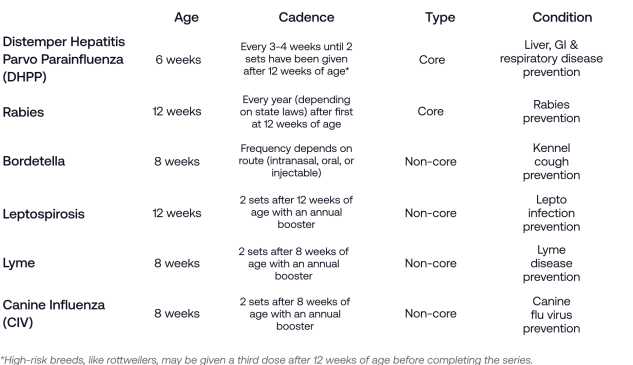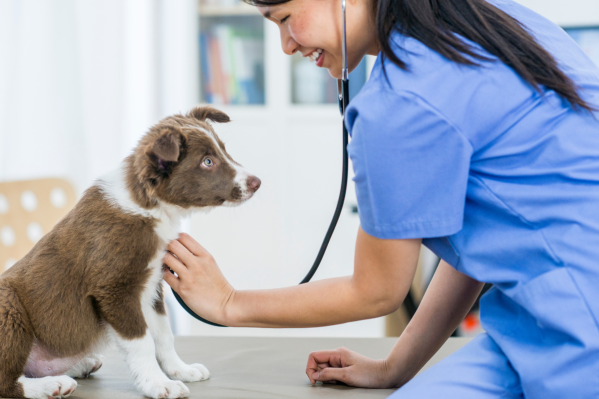Congratulations on your new dog! This can be an exciting and, well, overwhelming time for new pet parents. That's why Pawp Veterinarian, Dr. Stefanie Stewart, is here to walk you through everything you need to know when it comes to vaccinations for your new puppy or dog.
Every dog is unique and will require their own specific vaccine schedule, which will be tailored to their unique history, lifestyle, and risk factors. Dr. Stefanie Stewart strongly encourages new pet parents not to wait on getting a checkup:
"You should schedule an in-person physical exam of your new pet within the first week. At that appointment, your vet will examine your new pet, review their medical records, and develop an individualized vaccination plan."
- Dr. Stefanie Stewart
Puppy vaccine overview
Several vaccines are available for your puppy or dog that may help to protect them against different threats. The dog vaccine table below lists both core and non-core vaccine types, the recommended minimum age to start the series, how often the vaccine should be boosted, and what the specific vaccine helps to prevent.

Dog vaccine types & timelines
Many of these vaccinations are first introduced as a series. This includes an initial vaccine followed by one or more boosters generally given 3-4 weeks apart. Your vet may opt to give more than one vaccine in a visit, or decide it's best to separate the vaccinations — particularly in small breeds.
Core vaccines for dogs
Core vaccinations refer to vaccines that are required by law or that provide benefit to most dogs no matter their lifestyle or location. The core vaccines for dogs and puppies are:
DHPP
This combination vaccine, which stands for Distemper, Hepatitis [Adenovirus], Parvovirus, and Para-influenza, protects against liver, gastrointestinal, and respiratory disease.
It's usually started in puppies between 6-8 weeks of age and boosted every 3-4 weeks until they have received at least two boosters past the age of 12 weeks. The timing of those last two boosters is very important for proper immunization.
Some breeds (such as rottweilers and pit bull terriers) have higher risk of infection, and as puppies, may be recommended to receive an additional DHPP booster. Adult dogs receiving the DHPP vaccine for the first time may only require one booster to complete the initial series. Your vet will recommend boosters every 1-3 years depending upon individual circumstances.
Rabies
The rabies vaccination protects against the rabies virus. Your puppy must be at least 12 weeks of age to receive their rabies vaccination. This is often given at the last puppy wellness visit. This is boosted at 1 year of age and the schedule for subsequent boosters are determined by your state, ranging from yearly to every 3 years. The rabies vaccination is required by law and may only be given by a licensed veterinarian.
Non-core vaccines for dogs
Vaccinations that may only be beneficial to certain dogs based on geographic location, degree of socialization and travel, and other risk factors are termed non-core vaccinations. Non-core vaccinations that may be recommended by your vet include prevention for:
Bordetella (for “Kennel Cough”)
Lyme (for tick-borne Lyme disease)
Leptospirosis (for a bacterial infection causing kidney and liver failure)
Canine Influenza (for a canine-specific flu virus)
Bordetella may be given via multiple routes, so recommendations on frequency may vary and should be discussed with your veterinarian. The others generally abide by the rule of initial vaccination (at or after 8 weeks of age for puppies) with booster 3-4 weeks later, and annual boosters thereafter.
